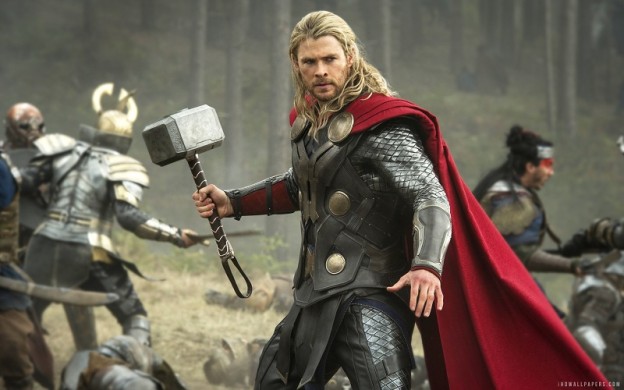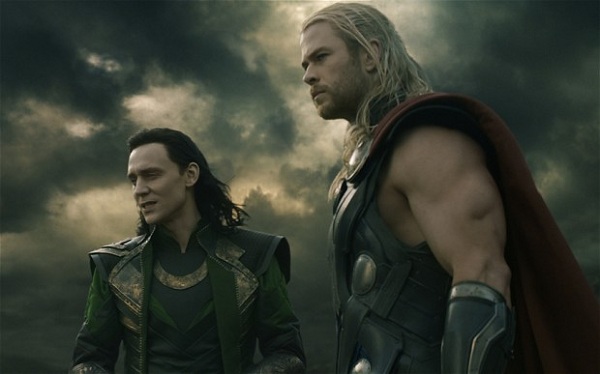The back-to-back billion-dollar box office takes of Marvel’s The Avengers and Iron Man 3 meant that Thor: The Dark World had even more pressure to live up to than the Tony Stark three-quel that preceded it. After all, Phase Two of what has been dubbed the Marvel Cinematic Universe is in full swing leading up to the 2015 release of Avengers: Age of Ultron, and since Iron Man 3 served as more of an epilogue to The Avengers than a driving force propelling the story into the future, it has fallen to the God of Thunder to save the (Marvel) universe.
Thor: The Dark World essentially picks up right where The Avengers left off. Having just led an alien invasion in New York City, Loki (Tom Hiddleston) returns to the kingdom of Asgard to pay for his crimes and is promptly locked away while Thor – his adopted brother (and heir to the throne) – is off defending the Nine Realms from assorted creatures, including the rock monster featured so prominently in the film’s trailer. However, a far greater threat soon arises as Malekith (Christopher Eccleston) and his Dark Elves launch a plan to recapture an all-powerful mystical object called the Aether, which has just so happened to fall into the hands of Thor’s unrequited love Jane Foster (Natalie Portman) on Midgard (aka Earth).
Like previous Marvel films, Thor: The Dark World falls into the trap of relying too heavily on the vague (and unnecessarily convoluted) mystery of a otherworldly object to get the plot in motion. Just as the slowest moments in The Avengers centered on the Tesseract, many of the film’s weakest moments focus on the poorly-explained powers surrounding the Aether, and as a result, the characters of Malekith and his minions are under-developed and left primarily as walking exposition machines. The details of their plan and their role in the larger Marvel universe are immaterial, as they are only present to allow Thor and Loki the means to reunite.
That being said, the moments when Hemsworth and Hiddleston share the screen – as in the first Thor – are among the best in the film, alternately hilarious and tragic, and make excellent use of the history we know about the complicated relationship between these two brothers. Hiddleston in particular steals every second he’s onscreen, proving why Loki has become such a fan favorite. It certainly helps that Thor: The Dark World gives him plenty of opportunity to tap into the morally ambiguous and incredibly unpredictable character’s unique perspective, keeping the tension on even in the film’s quieter moments. As it stands, Loki is far and away the most fascinating character in the Marvel Cinematic Universe and its only truly memorable villain at this point.
The rest of Thor: The Dark World’s cast doesn’t fare as well as the dynamic duo of Hemsworth and Hiddleston, unfortunately. Rene Russo, Idris Elba and Jaimie Alexander receive a few choice moments (Alexander’s character could be especially integral as this series goes on), but Portman, Anthony Hopkins and Stellan Skarsgård are saddled with dull, reactive roles that never truly pay off and fall flat compared to their work in the first Thor. Kat Dennings also returns as Jane Foster’s intern Darcy, and though the actress feels a bit shoe-horned into the plot at times, she is less grating than she was the first go-round and does get a few laugh-out-loud moments.
Despite some weak points with its larger plot and supporting cast, Thor: The Dark World does, in fact, improve on the first Thor film in several ways. Most noticeably, Asgard feels like a more grounded and earthier environment under the direction of Game of Thrones’ Alan Taylor. Take, for example, the more expansive shots of the kingdom’s inner workings as well as the fantastic dogfight that takes place along its surface. In addition, the film features a number of thrilling action set pieces, including one particularly clever one in the final act that allows viewers a better look at the Nine Realms and plants the seeds for further exploration of Marvel’s cosmic side (which will be even more developed in next year’s Guardians of the Galaxy).
Thor: The Dark World is by no means a perfect film, but like the best of Marvel Studios’ offerings, it captures the spirit of adventure, fun and Saturday-morning escapism that should bring fans back to their childhoods. What’s onscreen doesn’t all work. Yet, the elements of the film that do manage to strike such a chord that it’s easy to forgive the film its imperfections.
At this point, viewers are probably on-board with the Marvel Cinematic Universe or will sit this one out. Skeptics, please hop the next Rainbow Bridge home. The rest of you, sit back and enjoy.



From the way this review is written in the beginning, it seems that you would have ranked this film lower. I want to enjoy the fantasy aspect that this sequel has, but it is difficult for me since it doesn’t “ground” me.
I also don’t think Rene Russo’s character was utilized very well in either film. Although the plot focuses on the relationship between Thor and Loki, it would have been nice if there was more interaction with the mother. The dynamic between Loki and Frigga wasn’t really explored; just mentioned in the beginning of the film.
In any case, Thor: The Dark World was fun and a good watch. I agree with what was written about the villains. The “Thor” films disguise themselves as superhero action movies, but they are really about relationships.